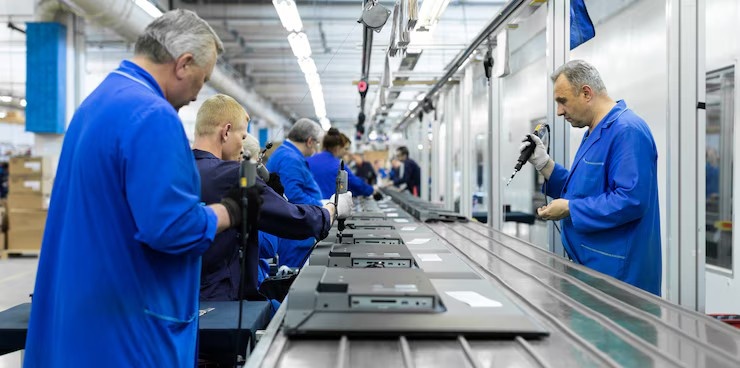What is a Smarter ERP and Why It’s Essential for Electronics Manufacturers
A more intelligent ERP (Enterprise Resource Planning) system is now necessary in the fast-paced electronics manufacturing sector, where innovations, speed, and accuracy fuel competition. A more intelligent ERP offers unparalleled departmental visibility and control by combining real-time data, machine connection, and AI-driven analytics. It guarantees that every production unit complies with quality standards, corporate objectives, and customer expectations from PCB design to final product shipping.
Manufacturers of electronics frequently face challenges with disjointed departments, manual processes, and fragmented data. Delays in production, waste of resources, and compliance issues result from this. Planning, inventory, procurement, and quality operations are all automated by more intelligent ERP systems, which overcome these difficulties. Investing in odoo implementation services gives businesses access to a flexible, customisable ERP that fits their unique processes, allowing them to scale rapidly and have complete control over their multi-level manufacturing operations.
Key Functional Modules in ERP That Simplify Electronics Production
Bill of Materials (BoM) Management: This module handles complex product structures by defining multi-level BoMs for each electronic product. It ensures precise material planning and cost estimation for every variant or configuration.
Production Planning & Scheduling: It automates production timelines, resource allocation, and task sequencing. Manufacturers can optimize workloads, reduce idle time, and meet delivery targets without delays.
Inventory & Warehouse Management: Tracks component availability, stock movements, and storage locations. Supports just-in-time inventory, batch tracking, and automatic reordering to avoid material shortages.
Quality Control & Compliance: Monitors product standards at every stage—from incoming raw materials to final testing. Ensures adherence to industry regulations and maintains audit-ready records.
Procurement & Vendor Management: Streamlines supplier interactions, quotations, and purchase orders. Allows vendor comparison, cost control, and ensures timely raw material availability.
Product Lifecycle Management (PLM): Manages engineering changes, product designs, and version control. Keeps development teams in sync while reducing time-to-market for new innovations.
Benefits of ERP-Driven Manufacturing for Scalability and Productivity
End-to-End Process Visibility: Gain complete insight into operations, allowing data-driven decision-making and faster identification of bottlenecks or inefficiencies.
Real-Time Inventory Control: Minimize excess stock and eliminate shortages with accurate, real-time tracking of components and finished goods.
Reduced Operational Costs: Automated workflows reduce manual errors, rework, and labor costs while optimizing material use and equipment downtime.
Scalable Manufacturing Operations: ERP systems grow with your business, enabling the addition of new product lines, factories, or business units seamlessly.
Faster Time-to-Market: Streamlined processes, coordinated departments, and integrated PLM help launch new products more efficiently.
Enhanced Compliance Management: Automated quality checks and documentation ensure you meet regulatory requirements across global markets.
Improved Supplier Collaboration: Efficient vendor management and integrated communication improve raw material sourcing and reduce procurement delays.
How ERP Automation Streamlines Multi-Level Operational Workflows
Multi-Stage Assembly Line Coordination: Automatically sequences and monitors each assembly stage to avoid bottlenecks and maintain workflow continuity.
Automated Work Order Generation: Generates work orders based on sales forecasts or inventory triggers, reducing planning efforts and avoiding production delays.
Machine and Equipment Integration: Connects ERP to shop-floor machinery for live status updates, predictive maintenance, and operational efficiency.
Quality Inspection Checkpoints: Inserts automated quality control steps during and after production, reducing defects and improving product reliability.
Warehouse and Logistics Synchronization: Aligns production output with inventory and delivery schedules, enabling timely dispatch and accurate order fulfillment.
Employee Task Assignment and Tracking: Assigns production tasks based on skill sets and availability while tracking individual performance for improvement.
Automated Documentation & Reporting: Generates real-time reports, compliance documents, and KPIs without manual input, aiding faster decision-making.
Choosing the Right ERP Partner for Implementation and Long-Term Success
Making the right choice when choosing an ERP implementation partner is essential to guaranteeing that your electronics manufacturing company gains from a scalable, well connected system. In addition to offering appropriate modules and a tailored solution that meets your operational requirements, a trustworthy partner should be aware of the difficulties facing your sector. Experience, customer success stories, post-launch assistance, and the capacity to future-proof your ERP system should all be taken into account.
You can get customized solutions based on an established, open-source ERP platform by collaborating with professionals in odoo implementation services. Odoo’s modular architecture provides end-to-end capabilities, whether you need to automate inventories, improve traceability, or connect intricate BoMs. At every stage of manufacturing, a certified Odoo partner will guarantee seamless onboarding, staff training, and ongoing support, boosting productivity, compliance, and profitability.
 :
https://in.pinterest.com/bizoplesolutions
:
https://in.pinterest.com/bizoplesolutions

